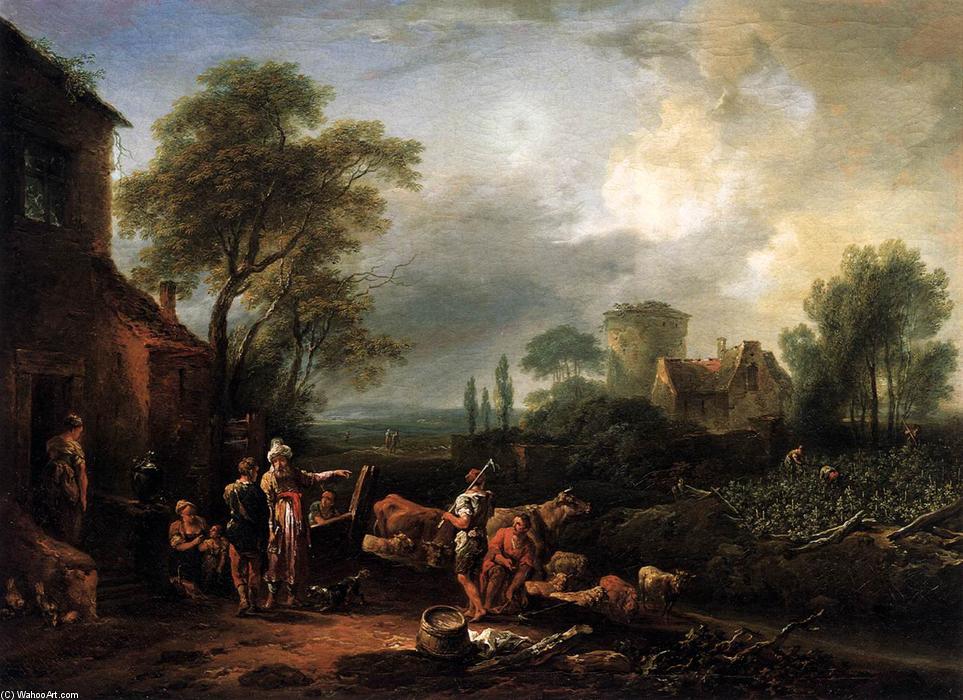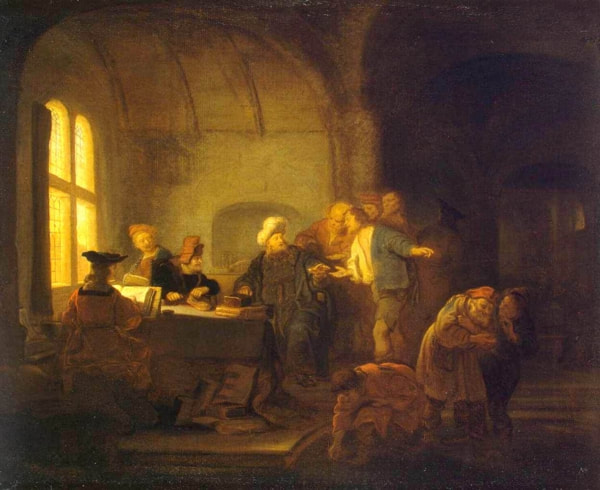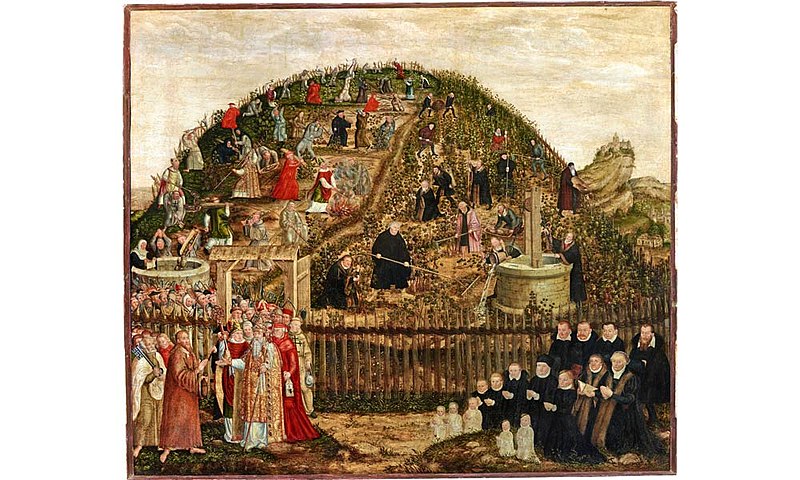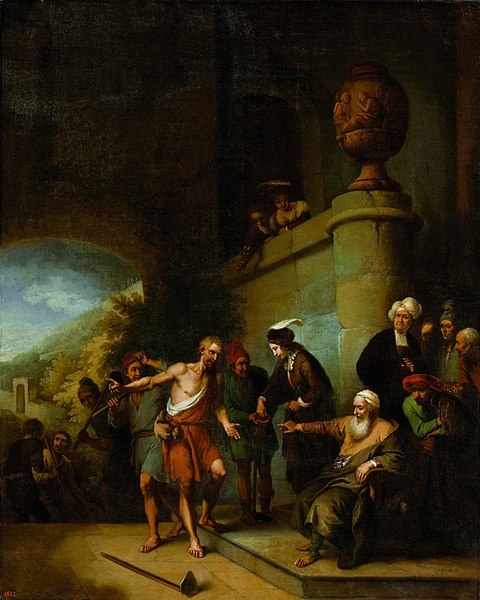Epistle: 1 Corinthians 9:24-10:5
24 Do you not know that in a race all the runners run, but only one receives the prize? So run that you may obtain it. 25 Every athlete exercises self-control in all things. They do it to receive a perishable wreath, but we an imperishable. 26 So I do not run aimlessly; I do not box as one beating the air. 27 But I discipline my body and keep it under control, lest after preaching to others I myself should be disqualified.
1 For I do not want you to be unaware, brothers, that our fathers were all under the cloud, and all passed through the sea, 2 and all were baptized into Moses in the cloud and in the sea, 3 and all ate the same spiritual food, 4 and all drank the same spiritual drink. For they drank from the spiritual Rock that followed them, and the Rock was Christ. 5 Nevertheless, with most of them God was not pleased, for they were overthrown in the wilderness.
Gospel: Matthew 20:1-16
1 [Jesus said] “For the kingdom of heaven is like a master of a house who went out early in the morning to hire laborers for his vineyard. 2 After agreeing with the laborers for a denarius a day, he sent them into his vineyard. 3 And going out about the third hour he saw others standing idle in the marketplace, 4 and to them he said, ‘You go into the vineyard too, and whatever is right I will give you.’ 5 So they went. Going out again about the sixth hour and the ninth hour, he did the same. 6 And about the eleventh hour he went out and found others standing. And he said to them, ‘Why do you stand here idle all day?’ 7 They said to him, ‘Because no one has hired us.’ He said to them, ‘You go into the vineyard too.’ 8 And when evening came, the owner of the vineyard said to his foreman, ‘Call the laborers and pay them their wages, beginning with the last, up to the first.’ 9 And when those hired about the eleventh hour came, each of them received a denarius. 10 Now when those hired first came, they thought they would receive more, but each of them also received a denarius. 11 And on receiving it they grumbled at the master of the house, 12 saying, ‘These last worked only one hour, and you have made them equal to us who have borne the burden of the day and the scorching heat.’ 13 But he replied to one of them, ‘Friend, I am doing you no wrong. Did you not agree with me for a denarius? 14 Take what belongs to you and go. I choose to give to this last worker as I give to you. 15 Am I not allowed to do what I choose with what belongs to me? Or do you begrudge my generosity? 16 So the last will be first, and the first last.”
Septuagesima Sunday
Matthew 20:1-16
Pastor James Preus
January 28, 2024
Is Salvation easy or hard? Is it difficult to be saved or is it effortless? Scripture appears to give two answers! In our Gospel lesson, we see that those who worked but one hour received the same wage as those who worked twelve, showing that our salvation does not depend on our works, but on God’s grace. Yet, in our Epistle lesson, St. Paul exhorts you to “run that you may obtain” the prize. On the one hand, Jesus says, “Come to Me, all you who labor and are heavy laden, and I will give you rest. Take My yoke upon you and learn from Me, for I am gentle and lowly in heart, and you will find rest for your souls. For My yoke is easy, and My burden is light.” (Matthew 11:28-30) Yet, on the other hand Jesus says, “Enter by the narrow gate. For the gate is wide and the way is easy that leads to destruction, and those who enter by it are many. For the gate is narrow and the way is hard that leads to life, and those who find it are few.” (Matthew 7:12-13) On the one hand, St. Paul writes, “For by grace you have been saved, through faith, and this is not your own doing; it is the gift of God, not a result of works, so that no one may boast.” (Ephesians 2:8-9) Yet, on the other hand, St. Paul writes, “Work out your own salvation with fear and trembling.” (Philippians 2:12)
So, what is the answer? Yes! Salvation is easy and Salvation is hard. Being saved is effortless and being saved is the most difficult thing in the world. Salvation is incredibly hard work, yet Salvation does not depend on your work whatsoever. But how can this be? To explain this, first, we must make a distinction between how Salvation is gained, and how Salvation is given and received.
Salvation is gained, that is, earned and won in no other way than through the hard labor and bitter sufferings and death of Jesus Christ. It is impossible for you to earn your salvation by your own works, because you are by nature a poor miserable sinner. Poor miserable sinners can only sin. They cannot please God. This is why Scripture proclaims, “None is righteous, no, not one; no one understands; no one seeks God. All have turned aside; together they have become worthless; no one does good, not even one.” (Romans 3:10-12, quoting Psalm 14:1-3) and “For all have sinned and fall short of the glory of God.” (Romans 3:23) The wages of sins is death, so the only wages you have earned from your labor is eternal death in hell. But the free gift of God is eternal life in Christ Jesus our Lord, which is received through faith (Romans 6:23). This is why St. Paul argues in Romans chapter 4, “Now to the one who works, his wages are not counted as a gift but as his due. And to the one who does not work but believes in Him who justifies the ungodly, his faith is counted as righteousness.” (vss. 4-5)
When we consider the labor of those workers in the vineyard, we can think of it as sacrifices. Work is a sacrifice offered up by the worker. Now, in the kingdom of heaven, there are two types of sacrifices: the sacrifice of atonement, which pays for sins and sacrifices of thanksgiving, which give thanks to God for His grace. There is and always has been and always will be only one sacrifice of atonement, and that is the sacrifice of Jesus Christ on the cross to make payment for the sins of the whole world. Only the blood of Jesus can satisfy God’s wrath against sin. Only the death of God’s Son can forever pay our debt and set us free. Therefore, all other sacrifices offered in the kingdom of heaven are sacrifices of thanksgiving.
That is why these laborers are all paid the same. Their work is a sacrifice of thanksgiving, not an atoning sacrifice. They are paid for the sake of the atoning sacrifice offered by Christ. That is why they all get paid the same. They all have the same Christ. They all benefit from the same sacrifice. And this sacrifice wins salvation for them whether they have worked a lot or a little. Those who grumbled showed that they had lost their faith in the atoning sacrifice of Christ, because they thought their sacrifices of thanksgiving were taking away their sins and winning salvation for them. They replaced Christ and His work with themselves and their own work as the object of their faith.
So, we see by how our salvation is gained, that it is the most difficult work imaginable. In fact, no one can accomplish this work except Jesus Christ alone. Yet, He has accomplished it for us! It is finished. Your sins are atoned for! You are forgiven. Now salvation for you is easy. It is a free gift received by faith alone.
Yet, here we encounter another problem: how salvation is given and received. Is salvation easily given and received? Well, in one sense, it is given and received very easily. Salvation is given through the Word and Sacraments. When the Gospel is preached and the Holy Sacraments of Baptism, Absolution, and the Lord’s Supper are administered, the Holy Spirit works through God’s promise to create and sustain faith in the hearer, so that the hearer is saved. How difficult is it to hear? How difficult is it to believe? How difficult is it to receive a free gift?
Well, as a matter of fact, it is incredibly difficult! First, we have false prophets and false teachers, who pervert the Word of God and proclaim lies, so Jesus must warn us to beware of false prophets, who come to us in sheep’s clothing, but inwardly are ravenous wolves (Matthew 7:15). Yet, even when you hear only the pure Gospel from a faithful preacher, there still stands an insurmountable obstacle between you and saving faith. The prophet Isaiah speaks of it in chapter 6, “Keep on hearing, but do not understand; keep on seeing, but do not perceive. Make the heart of this people dull, and their ears heavy, and blind their eyes; lest they see with their eyes, and hear with their ears, and understand with their hearts, and turn and be healed.” (vss. 9-10) This is why Jesus says to his disciples, “Blessed are your eyes, for they see, and your ears, for they hear.” (Matthew 13:16) Their eyes and ears are blessed, because God has opened them. “To you it has been given to know the secrets of the kingdom of heaven, but to them it has not been given,” Jesus told his disciples (Matthew 13:11). This is why Jesus says, “No one can come to me unless the Father who sent me draws him.” (John 6:44) And St. Paul writes to the Corinthians in his first epistle, “The natural person does not accept the things of the Spirit of God, for they are folly to him, and he is not able to understand them because they are spiritually discerned.” (1 Corinthians 2:14) and “No one can say, ‘Jesus is Lord,’ except in the Holy Spirit.” (1 Corinthians 12:3)
So, according to your sinful nature, not only are you incapable of pleasing God and earning your salvation by your own works, but you are also incapable of believing and accepting the Gospel, even as it is preached in its purity. Rather, the Holy Spirit must convert you, open your eyes and ears and heart to understand and accept the Gospel. This is what St. Paul refers to in Ephesians 2, when He says that God “made us alive together with Christ, even when we were dead in our trespasses.” (Ephesians 2:5) It is the Holy Spirit, who creates faith where and when it pleases God. So, to be given and to receive salvation is greatly difficult, beyond our ability. Yet, it does not depend on our ability, but on God’s grace, who gives and grants faith as a gift.
Okay, so I think we’ve got it. Salvation is difficult, yea, impossible for us to gain, yet God gains it for us through Christ Jesus. Salvation is hard, yea, insurmountable to give and receive, yet God gives and grants faith to receive it by grace. So, salvation is difficult, yet it is easy. Yet, why then does Jesus tell us to strive to enter the narrow door (Luke 13:24), and call the way hard, which leads to life? And why does St. Paul tell us to run, that we may obtain the prize (1 Cor. 9:24) and to work out our own salvation with fear and trembling (Philippians 2:12), if it is God’s work, and not ours, which will accomplish it?
Because we are not robots. God saves us monergistically, that is, only God accomplishes our conversion. Yet, God does not save us independently of the human will. He regenerates the human will, so that you do indeed feel remorse over your sins and choose Christ as your Savior. You cannot take credit for this work, but you certainly are going to experience the work being done in and through you!
I’m sorry, I took a passage earlier out of context. I quoted St. Paul from Philippians 2, saying, “work out your own salvation with fear and trembling.” (vs. 12) What he actually wrote is, “work out your own salvation with fear and trembling, for it is God who works in you, both to will and to work for His good pleasure.” (vss. 12-13) Now, in context, that says quite a different thing, doesn’t it? It is God who works in you! You will to do Christ’s will, because God is working in you. You work the works of Christ, because God is working in you to accomplish them. You are God’s workmanship, created in Christ Jesus for good works (Ephesians 2:10), so that you can say with St. Paul, “It is no longer I who live, but Christ who lives in me.” (Galatians 2:20)
So, when Jesus tells us to strive to enter the narrow door and when St. Paul tells us to run, that we may obtain the prize, they are not telling us that we will enter or obtain by our own strength, merits, or works. Rather, it is God who begins, sustains, and completes our salvation. Our salvation does not depend on our own works, but continuing in impenitent sin can destroy saving faith and lead a believer into damnation. St. Paul warns that the children of Israel who were baptized into Moses and ate and drank the same spiritual food and drink as us, were overthrown in the wilderness, because they chose idolatry, fornication, and grumbling over faith. So, Scripture exhorts us to keep working. Do not let your new self lie dormant, so that your old self takes control. Don’t stand in the marketplace idle all day, but get into the vineyard, and offer those sacrifices of thanksgiving. And you have this wonderful promise, that although you are called to work and strive, your salvation does not depend on your working and striving. Your salvation depends on God’s grace through Christ Jesus, who earned your salvation for you. And your faith remains secure by the power of the omnipotent Holy Spirit, who creates and sustains faith through the preaching of the Gospel and the Holy Sacraments. Through faith, your yoke is easy and your burden is light, because Christ promises you salvation, which does not depend on your works. So, is Salvation easy or hard? It is easy, only for those who have faith in Christ and continue to run race with hope. Without faith, it is impossible. Amen.




 RSS Feed
RSS Feed